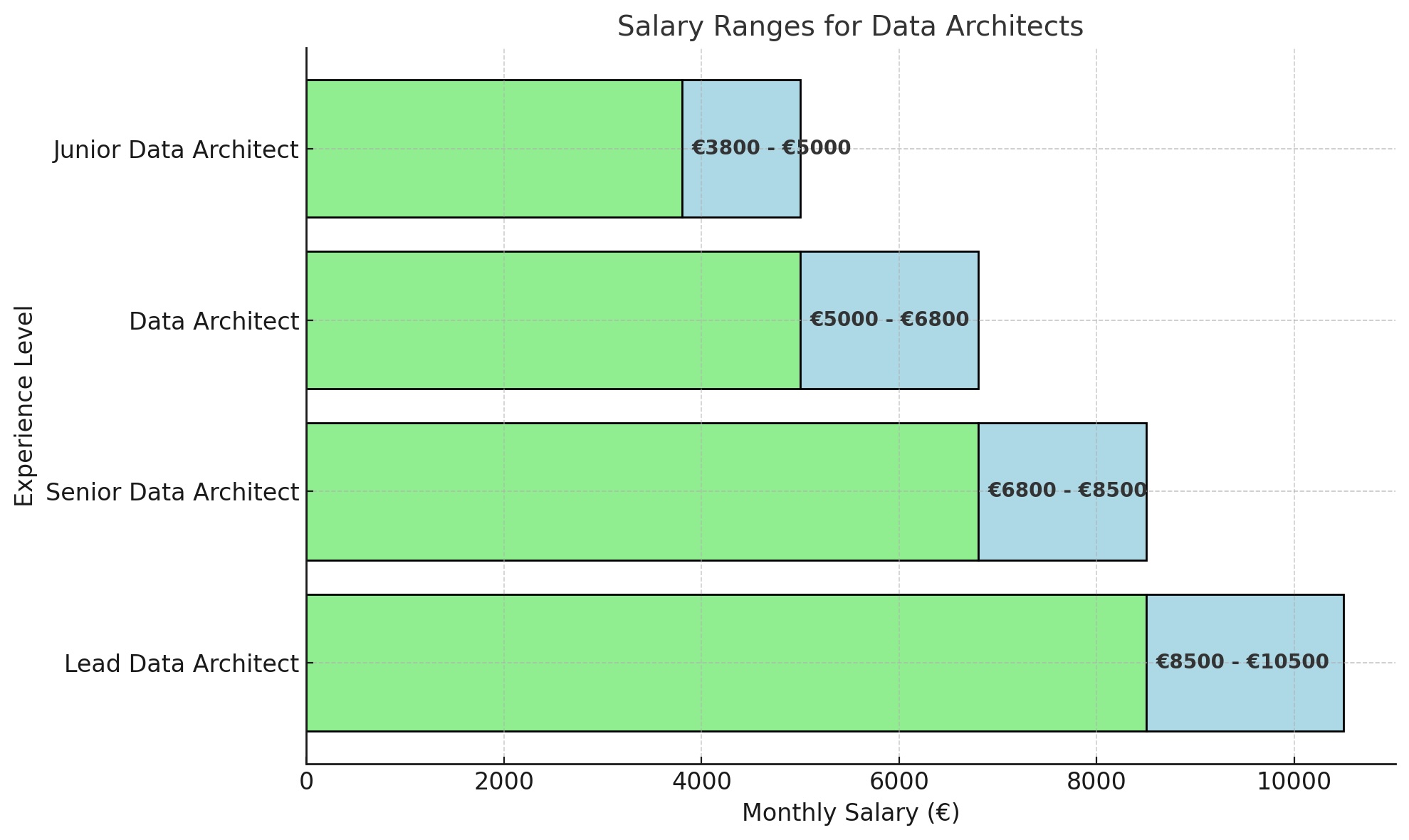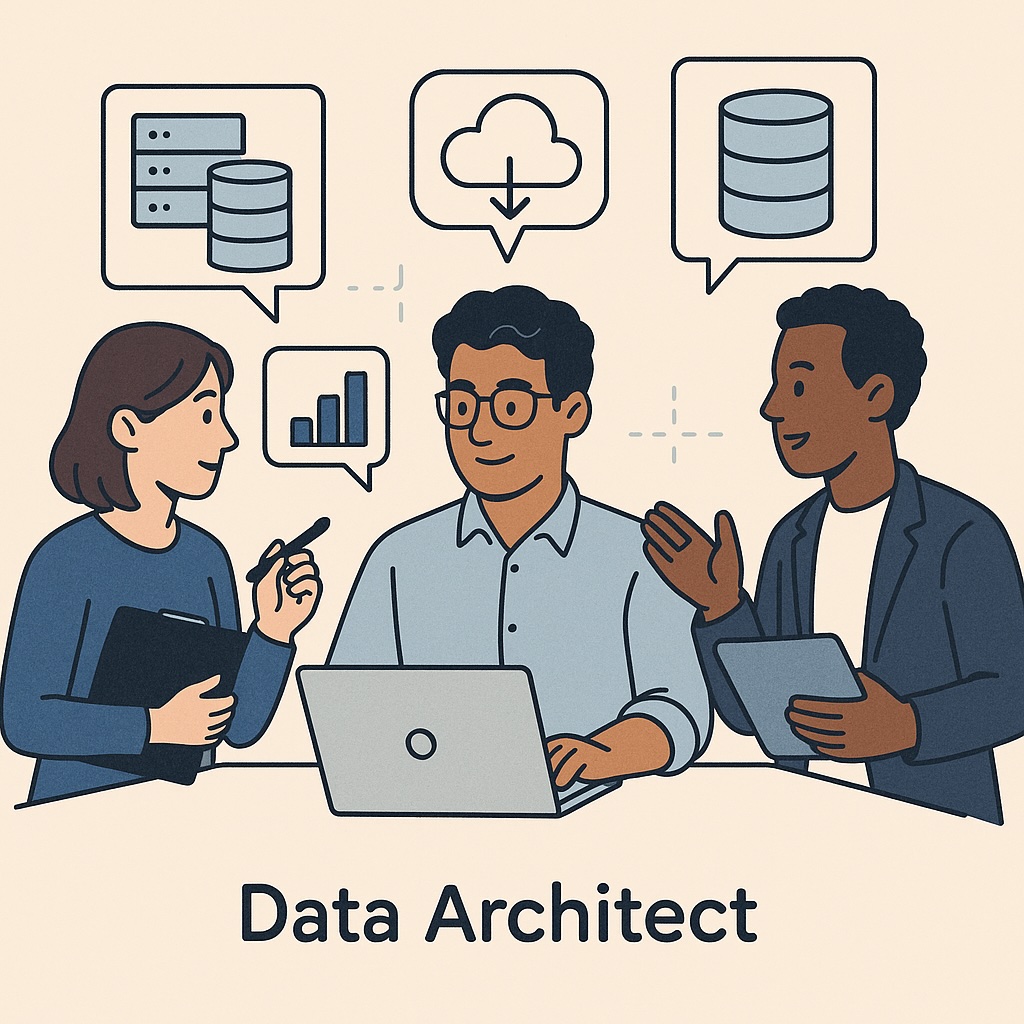What Does a Data Architect Do?
A Data Architect is the specialist in the field of data management, data structures, and data infrastructure. In a world where data drives innovation and decision-making, the Data Architect plays a crucial role. This expert ensures that organizations can make optimal and efficient use of data by designing, building, and managing robust and future-proof data systems.
What does a Data Architect do?
The responsibilities of a Data Architect are versatile and strategic in nature. They oversee the entire data landscape of an organization and work on solutions that align with both current and future needs. At the core of their work is creating clarity, structure, and quality in an increasingly complex data flow.
Key tasks and responsibilities
- Developing, documenting, and maintaining scalable data models and data structures that align with the architectural principles of the organization.
- Designing, implementing, and optimizing data warehouses, data lakes, and databases, tailored to business goals and performance requirements.
- Monitoring data quality, integrity, availability, and security across all systems and platforms.
- Actively collaborating with data engineers, data scientists, software developers, and other IT teams to realize end-to-end data strategies and technical solutions.
- Analyzing business needs and translating functional requirements into robust, scalable, and efficient data architectures.
- Supporting data analytics, AI solutions, and business intelligence projects with a well-designed data landscape.
- Keeping up with technological developments in cloud platforms, data integration, and data security, and translating these into tangible improvements within the organization.
The value of a good Data Architect
A professional Data Architect brings structure to data collections and makes data usable for analysis, reporting, and decision-making. This results in higher efficiency, better compliance, and a stronger competitive position. In modern organizations, the Data Architect is therefore an essential link between technology, data, and strategy.

Job Profile of a Data Architect
A typical job profile of a Data Architect includes:
- A relevant academic degree, such as computer science, information science, mathematics, or a related field.
- At least 5 years of work experience in data modeling, database design and development, preferably in a complex enterprise environment.
- In-depth knowledge of data integration, data governance, and master data management (MDM).
- Experience with data warehousing solutions, ETL processes, and modern cloud data platforms such as Snowflake, Databricks, Google BigQuery, or Azure Synapse.
- Knowledge of big data technologies such as Hadoop, Apache Hive, and Spark, and experience with processing structured and unstructured data.
- Strong analytical and problem-solving skills, combined with strategic thinking capabilities.
- Proficiency in visualizing data flows and architectures, for example using tools like ER/Studio, ArchiMate, or Lucidchart.
- Experience with data security, privacy legislation (such as GDPR), and compliance guidelines.
- Excellent communication skills, both verbal and written, to clearly and convincingly convey complex data issues to IT teams, management, and other stakeholders.
- Knowledge of and experience with various programming languages, such as SQL, Python, and Java. Knowledge of Scala and R is a plus.
The Growing Importance of Cloud and AI
The modern Data Architect increasingly operates in a cloud-native environment. Hybrid and multi-cloud architectures are becoming the standard, making knowledge of platforms like AWS, Azure, and GCP essential. In addition, the importance of AI integrations within data architecture is growing, with the Data Architect also being responsible for facilitating machine learning workflows and real-time analytics.
Personal Attributes
- Vision on the role of data within strategic business operations.
- Leadership and persuasiveness in multidisciplinary teams.
- Accuracy and attention to detail, without losing sight of the bigger picture.
- Curiosity and a strong drive to stay up to date with technological developments.
Why Is This Role Important?
Organizations that want to effectively use data for decision-making, innovation, and competitive advantage rely on a robust and future-proof data architecture. The Data Architect is the bridge between technical implementation and strategic data usage – a key role in any data-driven organization.

Which Tools Does a Data Architect Use?
Databases
To manage the enormous volumes of data generated by modern organizations, data architects use various types of databases. Relational databases such as MySQL, PostgreSQL, Oracle Database, and Microsoft SQL Server remain important for structured data. Additionally, NoSQL solutions like MongoDB, Cassandra, and DynamoDB are increasingly used for unstructured or rapidly growing datasets. The choice of database depends on factors such as scalability, speed, consistency requirements, and data structure. More and more, data architects also work with hybrid solutions, where relational and NoSQL databases coexist.
Data Modeling Tools
Data architects use data modeling tools to visualize complex data structures and design sustainable database architectures. Tools like ER/Studio, Sparx Systems Enterprise Architect, and IBM InfoSphere Data Architect are widely used in traditional environments. Modern, more visual solutions such as Lucidchart or dbt (data build tool) simplify modeling in cloud-based or agile environments. These tools are essential for creating conceptual, logical, and physical models, and promote better collaboration with data engineers and business stakeholders.
ETL and ELT Tools
Extract, Transform, Load (ETL) tools are indispensable for moving data between systems. Traditional solutions such as Informatica PowerCenter, IBM InfoSphere DataStage, and Microsoft SQL Server Integration Services (SSIS) are often used in on-premise environments. In modern, cloud-based data architectures, the focus increasingly shifts to ELT processes (Extract, Load, Transform), with tools like Fivetran, Apache Airflow, Talend, and dbt playing a central role. These tools enable automated, scalable data flows between sources, data lakes, and data warehouses.
Big Data Tools
Big data solutions are essential for processing very large and rapidly changing datasets. Data architects use frameworks like Hadoop and Apache Spark for distributed processing. Hive enables SQL analysis on Hadoop clusters, while Elasticsearch offers real-time search functionality. Modern cloud solutions like AWS Glue and Google BigQuery provide scalable and managed big data processing. These tools are indispensable for organizations working with log data, sensor data, streaming data, or other types of complex datasets.
Cloud Platforms
The transition to the cloud has profoundly changed the way data architects design systems. Knowledge of cloud providers such as Amazon Web Services (AWS), Google Cloud Platform (GCP), and Microsoft Azure is crucial. In addition, the popularity of Snowflake as a cloud-native data warehouse is growing rapidly due to its scalability and performance. Data architects must be familiar with cloud storage, data lakes, security, network architecture, and serverless computing.
Data Visualization Tools
Data must not only be well stored but also clearly presented. Data architects therefore often collaborate with analysts and use tools like Tableau, Microsoft Power BI, QlikView, and Looker (part of Google Cloud) to create dashboards and reports. These tools support interactive visualizations and easily integrate with data warehouses and BI platforms. They make it possible to share insights with stakeholders in real time and support data-driven decision-making.
Data Governance Tools
Good data quality and regulatory compliance are essential. Data governance tools help document, manage, and secure data assets within an organization. Popular solutions include Collibra, Informatica Axon, IBM Data Governance Catalog, and OneTrust. These tools support the creation of data policies, data lineage, metadata management, and privacy management in accordance with regulations such as the GDPR. In modern organizations, data governance is not only a compliance requirement but also a strategic advantage.
Programming Languages and Scripting
A modern data architect is not only strategically skilled but also technically proficient. Knowledge of programming languages such as Python, R, Java, SQL, and Scala is often required. Tools like Dask (for parallel processing in Python) are also gaining popularity. These programming languages are used for data analysis, pipeline scripting, integrations, and building custom solutions in a data architecture.

Which Personal Traits Suit the Role of Data Architect
What personal qualities suit the role of Data Architect?
A Data Architect plays a key role within a data-driven organization. In addition to in-depth technical knowledge, there are specific personal qualities that are essential for success in this role. Below are the most important competencies and personality traits that match the profile of a modern Data Architect.
Analytical thinking
A Data Architect possesses strong analytical skills. Analyzing complex datasets, identifying underlying patterns, and drawing well-founded conclusions are daily tasks. This requires not only abstract thinking, but also the ability to logically connect various data sources and derive strategic insights.
Accuracy and attention to detail
In a world where data quality is crucial for decision-making, a small error can have major consequences. A Data Architect must be extremely accurate when designing, documenting, and implementing data structures. This requires sharp focus, discipline, and a systematic work approach.
Problem-solving ability
Every organization faces unique data challenges, such as outdated databases, integration issues, or inconsistencies between systems. A good Data Architect thinks in terms of solutions, has a creative mindset, and knows how to turn technical obstacles into opportunities for improvement. Critical thinking and proactive behavior are essential in this context.
Strong communication skills
Although the role of Data Architect is highly technical, communication is an essential part of the job. Being able to convey complex ideas to non-technical stakeholders, such as management or end users, is crucial. A Data Architect must also be able to collaborate effectively with data engineers, analysts, and other IT professionals.
Patience and perseverance
Designing a solid data architecture is neither simple nor quick. It requires sustained focus, careful coordination with various stakeholders, and the ability to persevere even when facing setbacks. Perseverance and stress resistance help a Data Architect consistently deliver, even in large and complex projects.
Curiosity and technological inquisitiveness
Data architecture is a dynamic field. New technologies, cloud solutions, data standards, and security requirements evolve rapidly. A Data Architect is therefore curious and naturally interested in innovation. He or she continually develops through courses, certifications, and staying on top of the latest trends.
Decisiveness and strategic insight
Data Architects often make decisions with a significant impact on an organization’s information systems. Consider the choice of a specific cloud infrastructure, database platform, or data integration tool. This requires confidence, vision, and the ability to make well-considered decisions that are sustainable in both the short and long term.
Organizational awareness and sense of responsibility
A good Data Architect understands the broader context in which they operate. Knowing the strategic objectives of the organization helps in making appropriate architectural decisions. Additionally, a strong sense of responsibility is important: a Data Architect is aware of the impact of their work on data security, privacy, and compliance.
Future-oriented thinking
Data architecture is not a snapshot in time but a foundation for the future. A successful Data Architect thinks ahead and designs solutions that are scalable, flexible, and future-proof. This requires vision, long-term planning, and the ability to anticipate and apply technological developments.
In summary
The role of Data Architect requires a unique combination of technical expertise and personal qualities. Analytical thinking, precision, communication skills, curiosity, and decisiveness together form the foundation for success in this role. Those who recognize themselves in this profile and continue to develop can make a valuable contribution to the digital transformation of their organization.

A Day in the Life of a Data Architect
A Data Architect is the bridge between technology and strategy. Someone who not only understands databases but also knows how data functions as the backbone of an organization. So what does a typical day look like in practice? We’ll take you along from the first cup of coffee to the final update of the data structure.
08:00 – Starting the day with data (and coffee)
The workday begins calmly. With a steaming cup of coffee, the Data Architect opens their dashboard. Did the overnight data pipelines run smoothly? Are there any latency issues or error messages in the data landscape? Often, an automated monitoring tool is linked to the data infrastructure to detect potential incidents early.
Example: an ETL pipeline to the marketing database has failed due to a changed API from an external provider. The Data Architect immediately schedules a meeting with the relevant data engineer to resolve the issue.
09:00 – Daily stand-up with the data team
During the stand-up, the team — consisting of data engineers, analysts, BI specialists, and the architect — discusses the progress of ongoing projects. What’s going well? Where are the bottlenecks? The Data Architect usually focuses on the bigger picture: do the current data sources and structures enable the organization to gain reliable insights?
They also discuss whether new data requests from the business affect the architecture.
10:00 – Designing a new data model for Sales
A sales manager wants more control over conversion in the sales funnel. The Data Architect collaborates with an analyst and sales representative to understand the information flows. Which systems are involved? What data is being captured? Where are the gaps?
Result: a new data model that integrates data from the CRM, email campaigns, and call center logs. The architect uses tools like dbt or ER/Studio to create a visual model.
11:30 – Reviewing existing data architecture
A recurring task: evaluating existing structures. Are the tables still logically organized? Are redundant data being stored? Are the indexes still optimal?
Today, the Data Architect reviews a legacy database originally intended for customer data but now also used for service history. A performance and compliance risk. The recommendation: split into a relational structure with clear segmentation.
12:30 – Lunch and tech talk
During lunch, the Data Architect joins an internal tech talk on the use of data mesh in decentralized organizations. New insights are gained and shared via internal knowledge channels. Sometimes, inspiration for personal projects emerges directly.
13:30 – Meeting with security & compliance
Data is not only about technology but also about trust. In a meeting with the security team, the Data Architect discusses new guidelines for data encryption and GDPR compliance. Are data flows sufficiently protected? What about access rights?
The architect takes this into account when designing data layers — for example, by separating PII (Personally Identifiable Information) from analytical datasets.
15:00 – Project planning: migration to cloud platform
The organization is transitioning to a cloud data warehouse (such as Snowflake or BigQuery). The Data Architect develops a migration plan. Which datasets will move first? How are dependencies managed? What is the fallback strategy?
They also examine data lineage — the origin of the data — to ensure everything remains traceable, even in the new environment.
16:30 – Documentation and updating blueprints
A good Data Architect documents continuously. At the end of the day, changes to data models, data flows, and governance principles are recorded in central repositories such as Confluence or Git. This facilitates collaboration and prevents knowledge loss.
Additionally, the data architecture is visually updated, for example in ArchiMate, Lucidchart, or an enterprise architecture tool.
17:30 – Reflection and self-development
The day ends with a moment of reflection. What went well? What needs further exploration? The architect browses through a new article on semantic layers in BI tools or registers for a webinar on data governance.
In the world of data, standing still means falling behind. That’s why continuous learning — even a little every day — is part of the job.
In conclusion
A day in the life of a Data Architect is dynamic, analytical, and strategic. You switch between technical details and organizational goals, between code and communication. It’s a role where you lay the foundation for decision-making.
Would you like to work as a Data Architect? Check out our vacancies at DataJobs.nl and discover where you can make a difference.

What does a Data Architect earn?
The salary of a Data Architect can vary significantly depending on experience, location, sector, and the complexity of the IT and data structure within an organization. Data Architects play a crucial role in designing and maintaining the data infrastructure that companies use for data analysis, storage, and processing. Below is an overview of salary expectations based on different experience levels.
Entry Level (Junior Data Architect)
A Junior Data Architect, often with a background in data engineering, software development, or computer science and a few years of experience with data systems, typically earns between €3,800 and €5,000 per month. At this stage, one often works under supervision on designing smaller parts of the data architecture and supports the setup of database structures, data models, and integrations. Familiarity with technologies such as SQL, ETL processes, data warehouses, and cloud platforms (such as AWS or Azure) is desirable.
Mid-level (Data Architect)
A Data Architect with 3 to 7 years of experience usually earns between €5,000 and €6,800 per month. At this level, the architect is responsible for designing scalable data structures, setting data standards, and monitoring data quality and security. Data Architects work closely with data engineers, analysts, and IT teams to build a robust data foundation aligned with the organization's strategic objectives.
Senior Level (Senior Data Architect)
A Senior Data Architect with more than 7 years of experience can expect a salary between €6,800 and €8,500 per month. These professionals are responsible for complex data platforms, enterprise data architectures, and cloud-based data models. They often serve as a bridge between business and IT, provide strategic advice, and ensure that data solutions are scalable, compliant, and future-proof. Senior Architects frequently make decisions related to system integration, data governance, and security.
Lead or Principal Data Architect
A Lead Data Architect or Principal Data Architect often works in large organizations or international environments and typically earns between €8,500 and €10,500 per month or more. These experts lead data architecture teams, define the organization’s technical data strategy, and coordinate large-scale data migrations or transformations. They have deep knowledge of data ecosystems, enterprise architecture principles, and modern data platforms such as Snowflake, Databricks, or Google Cloud Platform.
Location and Sector
As with other data-related roles, location and sector also influence a Data Architect’s salary. In the Randstad area (Amsterdam, Utrecht, Rotterdam), salaries are generally higher due to the presence of large companies and tech firms. Sectors such as financial services, healthcare, telecom, and e-commerce often offer higher salaries due to the complexity and importance of their data systems. International or data-driven organizations also tend to invest more in data architecture.
Education and Skills
Data Architects often hold a bachelor’s or master’s degree in computer science, software engineering, data science, or a related field. Salaries are positively influenced by experience with tools and languages such as SQL, Python, Spark, Kafka, NoSQL databases, data modeling tools (like ER/Studio or ERwin), and cloud platforms (AWS, Azure, GCP). Certifications such as AWS Certified Data Analytics, Google Professional Data Engineer, or TOGAF can enhance the profile and increase salary potential.

Career Path and Growth Opportunities as a Data Architect
Career Path and Growth Opportunities as a Data Architect
A career as a Data Architect is not only intellectually challenging but also offers excellent growth opportunities within the field of data and IT. In a world where data is increasingly central to business strategies, the demand for experienced Data Architects continues to rise.
Advancing to Senior Roles
After gaining a few years of experience, you can progress to more senior roles such as Senior Data Architect, Enterprise Data Architect, or Chief Data Architect. In these positions, you take on strategic responsibilities and work on complex data ecosystems within large organizations. You may lead a team and be closely involved in policymaking related to data management and architectural principles.
Specialization and Technological Deepening
There is plenty of room for specialization within this field. Think of focusing on cloud computing (such as AWS, Azure, or Google Cloud), big data solutions, data governance, AI and machine learning infrastructures, or specific database systems. By deepening your knowledge in a particular technology, you can position yourself as an expert in your niche and accelerate your career.
Sector-Focused Growth
In addition to technological deepening, you can also specialize in a specific sector. Consider financial services, the healthcare sector, e-commerce, logistics, or the public sector. Sector-specific knowledge is often a plus for large projects, as it allows you to understand not only the technical aspects but also the specific business needs.
From Operational to Strategic
At the start of your career, you’ll primarily be involved in designing databases, data structures, and data flows as a Data Architect. As you grow, your role shifts to a more strategic level: you define data architecture principles, advise stakeholders, and translate business needs into robust data strategies.
Career Beyond the Technical Track
Not every Data Architect remains technically active. Some professionals choose to transition into roles such as Data Manager, Product Owner Data, or Data Governance Consultant. These positions bridge the gap between technology and business and require strong communication skills and organizational insight.
Continuous Learning and Certification
Data-related technology evolves rapidly. Taking courses and earning certifications such as TOGAF, CDMP (Certified Data Management Professional), or cloud certifications from AWS and Azure can give your career a significant boost. Staying updated on trends in data security, privacy regulations (such as GDPR), and AI is also essential to remain relevant.
Conclusion
A career as a Data Architect is dynamic, challenging, and full of growth opportunities. Whether you choose to specialize in technology, expand toward strategy, or transition into a specific sector – the possibilities are abundant. With the right combination of experience, expertise, and curiosity, you can play a key role in the data-driven transformation of organizations.

Training and Certification for Data Architects
To be successful as a Data Architect, it is essential to continuously invest in your professional development. The world of data is evolving rapidly, and staying up to date with the latest technologies, tools, and best practices is crucial. In addition to a relevant academic background, such as a degree in Computer Science, Data Science, or a related field, there are various recognized certifications and training programs that can elevate your career as a Data Architect to the next level.
Why Certification Is Important for Data Architects
Certifications not only demonstrate your knowledge, but also enhance your credibility with employers, clients, and colleagues. They serve as proof that you possess up-to-date and in-depth expertise in data architecture, cloud solutions, data modeling, and enterprise architecture. Moreover, they help you structure your knowledge and stay informed about innovations within your field.
Key Certifications for Data Architects
Below is an overview of popular and in-demand certifications relevant to professionals who want to grow or specialize as Data Architects:
AWS Certified Solutions Architect
This certification from Amazon Web Services (AWS) focuses on designing and implementing scalable, reliable, and secure cloud solutions. As a Data Architect, you’ll learn how to design complex data structures within the AWS environment and optimize data infrastructures for performance and cost.
Microsoft Certified: Azure Data Engineer Associate
This certification from Microsoft is designed for professionals building data solutions using Azure tools and services. You’ll learn how to manage data storage, perform data transformations, and design secure data pipelines within the Azure ecosystem. The certification aligns well with roles that center on data integration, modeling, and supporting data-driven decision-making.
Google Cloud – Professional Data Engineer
The Google Cloud Professional Data Engineer certification focuses on designing, building, and managing data architectures using Google’s cloud solutions. You’ll work with BigQuery, Dataflow, Pub/Sub, and other powerful tools to create scalable, secure, and insightful data solutions.
TOGAF (The Open Group Architecture Framework)
TOGAF is a framework for developing enterprise architectures. The certification helps you think structurally about the long-term architecture of organizations. For Data Architects who want to contribute and operate at a strategic level, TOGAF is a valuable addition. It provides guidance for applying architectural principles within larger IT ecosystems.
Emerging and Additional Certifications
In addition to the certifications mentioned above, there are also new and emerging options increasingly in demand for data roles:
- Databricks Certified Data Engineer Associate – focused on building data solutions using Apache Spark and the Databricks platform.
- Snowflake SnowPro Core Certification – valuable if you work with modern cloud-based data warehousing solutions.
- CDMP (Certified Data Management Professional) – a broader certification covering data governance, data quality, and metadata management.
Keep Developing Yourself
Earning a certification is a significant milestone, but it is just as important to keep your knowledge up to date. Regularly attend training courses, join (online) seminars, and continue experimenting with new tools. Also consider developing soft skills such as communication, project management, and stakeholder management – all essential for the modern Data Architect role.

By investing in education and certification, you demonstrate that you have the knowledge, skills, and commitment to play a key role as a Data Architect in the digital transformation of organizations. You strengthen your position in the job market and contribute directly to the smarter and more efficient use of data.
Networking and Industry Associations
Industry Associations for Data Architects: DAMA and IAIDQ
For any Data Architect who wants to stay informed about the latest developments in data management and data infrastructure, involvement in professional industry associations is essential. Two leading associations in this field are the Data Management Association (DAMA) and the International Association for Information and Data Quality (IAIDQ).
DAMA operates globally and focuses on promoting data management as a professional discipline. Members gain access to a wide range of knowledge resources, including the renowned DAMA-DMBOK framework, webinars, white papers, and international events. IAIDQ focuses on improving data quality and information management within organizations. This association also offers members access to valuable tools, networking sessions, and training opportunities.
By joining these industry associations, you not only enhance your domain knowledge but also actively work on your professional visibility. It provides opportunities to learn from fellow experts, participate in discussions about the future of the field, and build a strong reputation within the community.
The Importance of Active Networking
Networking is a key part of a Data Architect’s professional growth. Building relationships with other experts in the field opens doors to new insights, collaboration opportunities, and career paths. Regular participation in seminars, workshops, meetups, and (inter)national conferences helps you stay informed about best practices and emerging technologies such as data mesh, metadata management, and cloud-native data architectures.
By being visible within your network, you're more likely to be noticed for challenging projects or key roles within data-driven organizations. There's also much to learn and share within professional groups, user associations, or expert panels. Active participation is often the fastest route to recognition as a thought leader in the domain of data architecture.
Online Communities and Platforms for Data Architects
In addition to physical networking events, online communities offer plenty of opportunities to expand your network and deepen your professional knowledge. Think of specialized LinkedIn groups, online forums like Stack Overflow, Slack communities, and Discord servers focused on data architecture and data management.
These digital environments are ideal for sharing practical experiences, asking technical questions, and following discussions on current topics such as data privacy, governance, artificial intelligence, and data integration. By actively contributing to these platforms, you increase your visibility while gaining valuable knowledge from peers worldwide.
Online presence as a Data Architect also contributes to your personal brand. By making relevant contributions or sharing your own insights through articles or contributions to open source projects, you position yourself as an expert within a global network of professionals.

Impact and Social Relevance
The Crucial Role of a Data Architect in a Data-Driven Society
In an era where data is one of the most valuable assets, the Data Architect plays a key role. These professionals design and structure complex data systems that form the backbone of modern organizations. Thanks to their expertise, companies can efficiently process, analyze, and utilize data for strategic decision-making.
Impact on Organizations: From Efficiency to Innovation
The impact of a Data Architect on organizations is significant. By designing smart data models and scalable architectures, they help optimize processes, reduce costs, and accelerate innovation. Think of real-time dashboards, predictive analytics, and intelligent automation that directly influence an organization’s performance and competitive position.
Societal Relevance: Transparency and Trust
The societal relevance of a Data Architect goes beyond the corporate world. They contribute to transparency and trust in public and private institutions by making data available in a clear and accessible manner. This is of great importance for governments, healthcare institutions, educational organizations, and non-profits, where data-driven work is increasingly becoming the norm.
Safeguarding Privacy and Data Security
An important part of a Data Architect’s job is ensuring the integrity, security, and privacy of data. In a world where data breaches and cyberattacks are on the rise, they provide robust security layers and comply with regulations such as the GDPR. In doing so, they protect sensitive individual information and strengthen the trust of customers, citizens, and partners.
Data as the New Gold: Reliability and Quality
Data is often referred to as the new gold. The Data Architect is the one who refines and structures this gold, making it usable, reliable, and sustainably applicable. They ensure the quality, consistency, and accessibility of data by implementing clear standards, data models, and governance structures. This prevents errors, duplicate records, and inefficiencies, and ensures a single version of the truth within the organization.
Future-Proof and Strategically Indispensable
The role of the Data Architect is not only technical but also strategic. They see the bigger picture and anticipate future developments such as artificial intelligence, data ethics, and sustainable digitization. This makes them indispensable in building a resilient and future-proof society where data benefits people, markets, and communities.

Case Study: The Role of Data Architect
Background
BankPro, a leading player in the financial sector, was known for its customer-oriented approach and innovative services. But behind the scenes, the organization was struggling with a growing issue: a fragmented landscape of data and information flows. Spread across multiple systems, departments, and data sources, this led to major challenges in data consistency, compliance, and customer insight.
What began as a natural consequence of rapid growth and digitalization turned into a daily struggle for teams relying on reliable, up-to-date data – from customer service to compliance, from IT to management. The urgency to bring order to this data chaos kept growing.
The Challenge
BankPro found itself in a situation where crucial decisions had to be based on fragmented and sometimes conflicting data. Analysts spent more time cleaning and reconciling data than generating insights. Reports were delayed. Customer service often couldn’t answer client questions directly due to missing or non-integrated information. And with increasing regulatory scrutiny, the lack of oversight in compliance data became outright risky.
There was no unified data model. Departments worked with their own definitions, data sources, and tools. Data was trapped in silos, hindering collaboration and transparency. The organization was in urgent need of a central vision on data – and someone to bring that vision to life.
The Data Architect’s Intervention
That’s when Eva was brought in – an experienced Data Architect with sharp analytical skills and a pragmatic approach. Her assignment: structure BankPro’s data ecosystem so the organization could regain control over its information flows.
Eva started with a thorough inventory of all data sources, information flows, and use cases within the company. She spoke with teams at all levels of the organization to map out their needs, frustrations, and expectations. It quickly became clear that not only technical solutions were required, but also organizational alignment.
She designed a company-wide data model that served as a common language for all stakeholders. In addition, she established clear guidelines for data integration, governance, and metadata management. With the introduction of a central data hub, datasets from various systems could be unified and enriched.
Eva worked closely with IT, compliance, and the management team to ensure the new data architecture was not only future-proof but also embraced across the organization. Her approach wasn’t purely technical – she successfully brought people along in the change.
Result: From Data Chaos to Insight and Control
Within six months, BankPro began reaping the first rewards of the new approach. Thanks to the implementation of the central data architecture, previously isolated data sources could now effectively communicate. This led to:
- Faster, more reliable reporting for compliance and audit purposes
- Improved support for customer interactions, thanks to real-time customer data
- A significant reduction in errors, duplicates, and data loss
- A shared data structure that fostered collaboration between departments
Perhaps even more important: the cultural shift Eva initiated. Data was no longer seen as a technical afterthought, but as a strategic business asset. Teams spoke the same language, trusted the same source, and acted based on shared insights.
Thanks to Eva’s vision, leadership, and technical expertise, BankPro was able to transition from reactive to proactive data management – a vital development in a sector where trust, speed, and compliance are critical.

Looking for a Data Architect?
For a small fee, you can easily post your job vacancies on our platform and reach our large, relevant network of data and analytics specialists. Applicants respond directly to you, without any intermediaries.
On DataJobs.nl, we connect supply and demand in the data and analytics job market directly—without middlemen. You won’t find vacancies from recruitment agencies here. Visitors can view all job postings for free and without an account, and apply directly.
View the options for posting vacancies here. Questions? Contact us!

Op zoek naar een uitdaging in data & analytics?
Bekijk hier alle actuele kansen! See vacancies- What Does a Data Architect Do?
- Job Profile of a Data Architect
- Which Tools Does a Data Architect Use?
- Which Personal Traits Suit the Role of Data Architect
- A Day in the Life of a Data Architect
- What does a Data Architect earn?
- Career Path and Growth Opportunities as a Data Architect
- Training and Certification for Data Architects
- Networking and Industry Associations
- Impact and Social Relevance
- Case Study: The Role of Data Architect
- Job Openings for Data Architects
- Looking for a Data Architect?



